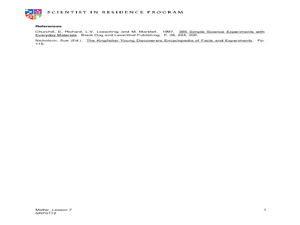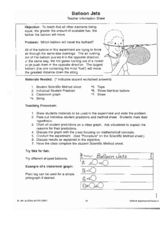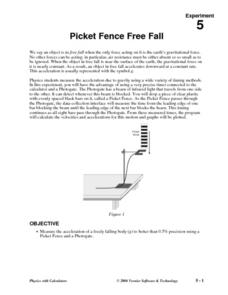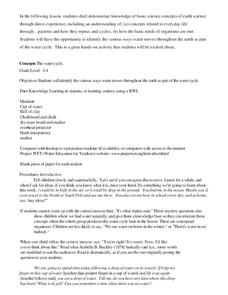Curated OER
Children's Literature Across the Curriculum Ideas-Harvey Potter's Balloon Farm
Students read Harvey Potter's Balloon Farm by Jerdine Nolen Harold. They complete a variety of cross-curricular activities surrounding the study of balloons. Included are reading, art, math, science, writing, social studies, and library...
Curated OER
Energetic Atoms - Active & Spaced Out
Students discover the power of the sun through an outdoor experiment. In this solar power lesson plan, students view a PowerPoint presentation on atoms before they complete an atom worksheet. Students utilize a solar bag to demonstrate...
Curated OER
The Same but Different Part II
Third graders experiment with beakers of water and balloons to measure the volume of the gas in the balloon. They determine ways to change the volume of air in the balloon which changes its size but not its physical state. By heating the...
Curated OER
THE ROLE OF A CONTROL IN THE EXPERIMENTAL DESIGN
Students study the role of controls. They discuss variables and list conditions, that if not kept the same for both flasks, could effect the outcome of the experiment. They come up with most of the following: Amount and temperature of...
Curated OER
Determining Momentum and Energy Loss of Balls Colliding Against Different Surfaces
Students experiment with the bounce of balls on various surfaces. In this physics lesson, students use various surfaces to bounce balls to study the momentum. This hands-on activity with the concepts of elasticity of surfaces which is...
DiscoverE
Keep-a-Cube
Waxed paper, newspaper, or aluminum foil? Keeping an ice cube from melting may require one or more of these materials. Learners design a box that will provide insulation so an ice cube stays intact for at least 90 minutes.
Teach Engineering
Insulation Materials Investigation
Don't melt away! Pairs investigate different insulation materials to determine which one is better than the others. Using a low-temp heat plate, the teams insulate an ice cube from the heat source with a variety of substances. They...
DiscoverE
Rocket-Powered Ski Lift
If a ski lift had rockets, imagine how fast it would be! Scholars let their imaginations take flight as they build models for such a ski lift. Rather than using a rocket, though, they'll use a much safer balloon as the power source.
Curated OER
Thinking Like a Scientist
Students explore the scientific method. Students identify the steps in the scientific method and explain what each step means. Students use these steps to determine if boys or girls are taller in their classroom.
Curated OER
Chemical Changes to Matter
Students analyze the causes of corrosion. In this chemistry lesson, students investigate what is necessary to cause chemical changes in matter. Students discover the causes of rust and tooth decay.
Curated OER
Balloon Jets
Young scholars investigate how fuel amount affects the distance traveled by balloons. In this physics lesson, students collect data and create a pictograph. They interpret data and formulate a conclusion.
Curated OER
Making A Natural pH Indicator
Students make their own pH indicator from red cabbage. Red cabbage contains a chemical that turns from its natural deep purple color to red in acids and blue in bases. Students boil the cabbage to get the pH indicator.
Curated OER
Observing Buffers In Lakes, Ponds And Streams
Young scholars observe the effects of limestone on the acidity of water. Some areas of the nation have a lot of limestone in lake bottoms and in soil, which helps neutralize the effects of acid rain. Students see this effect first hand.
Curated OER
Determining The pH Of Common Substances
Students use a pH indicator to measure the pH of some fruits, common beverages, and borax. Students discover how to differentiate between an object that is an acid or a base.
Curated OER
Picket Fence Free Fall
Young scholars measure acceleration using a Picket Fence and a Photogate. In this physics lesson, students drop an object and measure the acceleration of the object free falling. They log their data using the TI.
Curated OER
The Water Cycle
Young scholars access prior knowledge of the water cycle by completing a KWL. In this water cycle activity, students follow the movement of water through the water cycle.

















